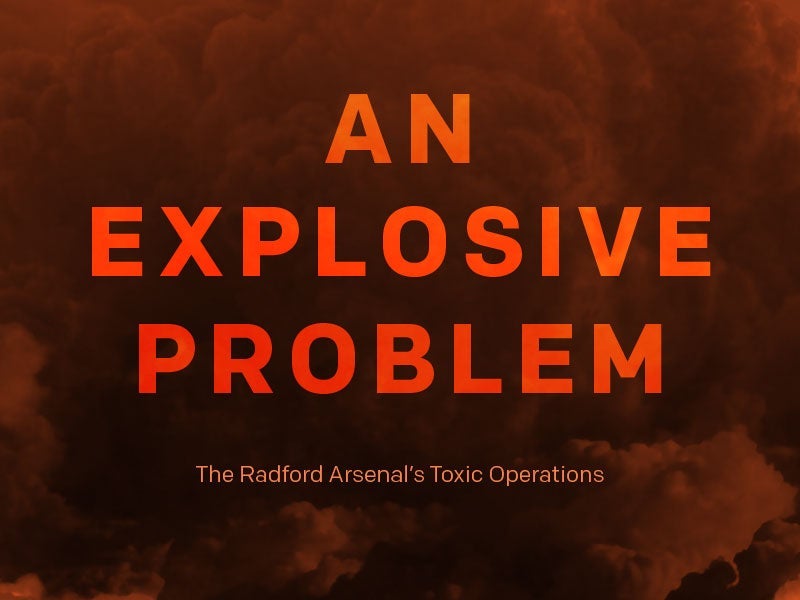Radford Arsenal: Toxic Contamination from Open Burning and Open Detonation
At military bases across the country, the Department of Defense has for decades relied on a practice known as open burn / open detonation to destroy excess, unserviceable, or obsolete military munitions.

At military bases across the country, the Department of Defense has for decades relied on a practice known as open burn / open detonation (OB/OD) to destroy excess, unserviceable, or obsolete military munitions, including small arms cartridges, rockets, mortars, missiles, and other items.
Open burn and open detonation harm the environment and human health as these practices result in the uncontrolled release of toxic constituents directly into the air, soil, and groundwater.
This report — presented by Earthjustice’s Community Partnerships Program and the Center for Progressive Reform in partnership with Citizens for Arsenal Accountability — focuses on one of the facilities that continues to use open burning to destroy munitions in close proximity to elementary schools, community members, and college students — the Radford Army Ammunition Plant (also known as “RAAP” or “the Arsenal”) in Radford, Virginia.
What is open burn? Primarily used to destroy propellants, open burn involves placing the materials on concrete pads or metal pans and burning them.
In some instances, if the items are large, the open burn occurs directly on the ground or in trenches.
What is open detonation? Mainly used for waste explosives and other types of munitions, open detonation can involve detonations on the soil surface or in a pit or trench below ground.
Historically, open burn / open detonation has been the standard method of disposal for excess, unserviceable, or obsolete military munitions.
RAAP has released millions of pounds of harmful toxins and heavy metals into surrounding communities and the environment as a result of its day-to-day operations.
The facility has made matters worse with its long record of violations and lack of compliance with permitting requirements.
As a result, nearby residents face pollution burdens that create an elevated risk of asthma and cancer compared to the rest of the state.
On top of all of this, RAAP and the Virginia Department of Environmental Quality (VDEQ) have also failed to provide sufficient transparency about operations at the Arsenal.
Community members are often left in the dark not knowing what they are being exposed to or what is being done to ensure they are protected.
In 2021, VDEQ renewed two ten-year hazardous waste permits for RAAP.
These permits lack crucial protections and information that community members need.
All of this means that RAAP is permitted to operate numerous hazardous waste burning units at once, exacerbating concerns that nearby communities will be exposed to significant amounts of toxic pollution indefinitely.
2020 Releases from RAAP
Source: EPA’s Enforcement and Compliance History Online (ECHO)
Nitrate compounds 10,249,528 lbs
Nitroglycerin 77,895 lbs
Ammonia 20,443 lbs
Nitric acid 3,102 lbs
Copper compounds 2,712 lbs
Lead compounds 1,632 lbs
Additionally, RAAP never assessed the cumulative impacts of multiple hazardous waste operations occurring together, and instead piecemealed each risk assessment to only look at one process at a time even though that is not how community members experience toxic hazards.
VDEQ also failed to sufficiently engage in outreach to community members during the permitting process, with many people unaware of the permit renewal processes at all and others provided with insufficient time to adequately comment on highly technical and complex documents.
Recommendations
The harmful pollution from RAAP has continued for too long without adequate oversight or accountability. As such, Citizens for Arsenal Accountability make the following recommendations:
- End Open Burning at RAAP: Open burning of hazardous wastes at RAAP must end, and the facility should put in place the safest alternative technology.
- Third-Party Alternatives Assessment: An alternatives assessment should be conducted by a neutral third party to ensure that the facility has chosen the most environmental and health protective option.
- Close the Old Incinerators: The two old incinerators at RAAP must close once an alternative technology is in place, pursuant to a transparent and enforceable schedule.
- Improve Transparency and Community Involvement: VDEQ and RAAP should make greater efforts to ensure that community members are aware of what is happening at the facility, including, for instance, creating an online repository of information.
- Improve Compliance: VDEQ must ensure that there are consequences for noncompliance and that the facility takes affirmative steps to make sure that violations do not continue to occur.
- Conduct a Cumulative Hazard Assessment and a Community Health Assessment: Virginia legislators should allocate funding so that a cumulative hazard assessment and a community health assessment can be conducted by a neutral third-party.
The Report
About Radford Army Ammunition Plant
- History of RAAP
- RAAP’s Operations Today
- RAAP’s Troubled Record
- Health & Environmental Impacts
Acknowledgements: This report was written by Lisa Fuhrmann, Earthjustice, and Darya Minovi, formerly CPR, with input and assistance from: Andrea Guerra, Thien Chau, and Khushi Desai, Earthjustice; and David Flores, formerly CPR. This report was written in partnership with Citizens for Arsenal Accountability, with feedback provided by Alyssa Carpenter, Trish McLawhorn, and Kellie Ferguson.
Media Inquiries
Community Partnerships Program
cpp@earthjustice.org
Earthjustice’s Community Partnerships Program provides legal and advocacy resources to local leaders demanding a safe, just, and healthy environment in which their communities can thrive — no matter how long the fight. Learn more.